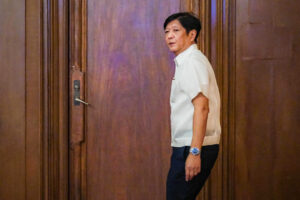
Marcos: PHL neither denies nor approves ICC presence
WHILE maintaining that he has not approved an International Criminal Court (ICC) investigation of the previous administration’s bloody war on drugs in the country, President Ferdinand R. Marcos, Jr. hinted on Tuesday that he allows the presence of its investigators on Philippine soil.
“I don’t approve or deny [ICC presence in the country]. You know, they haven’t done anything illegal. Once they do, of course, we will do something about it,” Marcos told reporters. “We are an open country; we are not a closed country.”
Still, Mr. Marcos made it clear that his administration, like that of his predecessor Rodrigo R. Duterte, would not cooperate with the ICC because it has no jurisdiction over the Philippines.
The ICC probe covers alleged crimes committed in Davao City from November 2011 to June 2016 when Mr. Duterte was still its mayor, as well as cases during his presidency up until March 16, 2019, the day before the Philippines withdrew from the treaty that established the ICC.
A Social Weather Stations (SWS) survey conducted on Dec. 8 to 11 last year showed that 53% of Filipinos agreed with the ICC probe of the drug war, up from 45% in March. The pollster, in a Feb. 20 report, said 26% were undecided and 20% disagreed.
The net trust that the ICC would be impartial in its investigation rose to +12 from +1 “but uncertainty continues to dominate,” according to the poll.
Meanwhile, an OCTA Research poll on Dec. 10 to 14 showed 55% of adult Filipinos were in favor of the Philippine government cooperating with the Hague-based tribunal’s investigation of the drug war.
On the other hand, 45% are opposed to cooperating with the ICC probe, OCTA said.
It said 59% of adult Filipinos were in favor of rejoining the ICC, while 41% opposed the idea.
In Congress, lawmakers called on Mr. Marcos to allow the Philippines to rejoin the ICC and send the “correct signal” to foreigners on the country’s stand on human rights.
“It’s all about sending the correct signals to our foreign friends and investors,” Party-list Rep. Ramon Rodrigo L. Gutierrez said. “We want to show them that we respect and uphold the rule of law, human rights.”
Last year, Mr. Gutierrez and Manila Rep. Bienvenido M. Abante, Jr. filed House Resolution No. 1477, urging the Philippine government to cooperate with the ICC’s investigation of the Duterte administration’s anti-drugs campaign.
“Rejoining the ICC would provide a critical mechanism for holding the government accountable, particularly concerning grave human rights abuses,” Assistant Minority Leader Arlene D. Brosas said in a statement.
“Given the widespread human rights violations in the Philippines, having independent oversight and accountability mechanisms is crucial,” she added.
When asked whether his government would change its stance on the ICC probe given the results of the latest opinion polls on the matter, Mr. Marcos said: “It’s still those questions of jurisdiction and sovereignty. I haven’t yet seen a sufficient answer for it.”
“Until then, I do not recognize their (ICC’s) jurisdiction in the Philippines,” he added.
The government estimates that at least 6,117 people were killed in Mr. Duterte’s drug war between July 1, 2016 and May 31, 2022, but domestic and international human rights groups say the death toll could be as high as 30,000.
The December SWS poll also showed that the percentage of those who had extensive knowledge of the ICC investigation rose to 14% from 10%, while those with partial but sufficient knowledge rose to 30% from 24%.
“On the other hand, those who had only a little knowledge slightly fell from 37%, while those who had almost no or no knowledge at all fell from 30%,” the pollster said.
Mr. Marcos in January said his government would not, in any way, cooperate with the ICC. But that was before his successor openly attacked his administration and called him a drug addict in a political rally in the southern Philippine city of Davao on Jan. 29.
Mr. Marcos had vowed to shift the focus of the drug war to rehabilitation, but the University of the Philippines Third World Studies Center’s Dahas project had reported that a year into his term, a total of 342 people had been killed by state actors in connection with illegal drugs.
Earlier this month, Dahas reported that at least 28 people had been killed in the anti-narcotics campaign in January, over a dozen of which were done by unidentified assailants. — Kyle Aristophere T. Atienza with a report from Beatriz Marie D. Cruz



